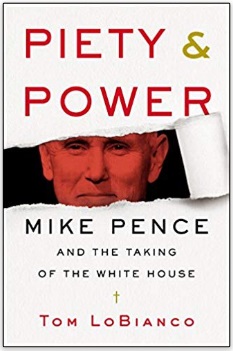 |
|
 |
|
 |
 |
 |
 |
 |
 |
 |
 |
 |
 |
| 2020 Election: | Joe Biden's book | Cory Booker's book | Pete Buttigieg's book | Kamala Harris' book | Bernie Sanders' book | Donald Trump's book | 2018 Senate Debates |
Piety & Power Mike Pence and the Taking of the White House by Tom LoBianco  (Click for Amazon book review)
BOOK REVIEW by OnTheIssues.org: Who is Mike Pence? He's less publicity-oriented than Donald Trump, so the public knows much less about him. This book serves as his re-election biography, since he has not written one of his own (this is an unauthorized biography; the author tried and failed several times to get input from Pence). The book explores Pence's famous self-description, "I'm a Christian, a conservative, and a Republican, in that order" (which appears on the frontispiece and in the preface) First, "a Christian": Pence is not a Bible-thumping evangelist, and is better described as a "man of faith" rather than a man of any particular religion. Pence was raised Catholic, but has attended nondenominational churches with his wife during their marriage and child-raising. His views certainly align with the Christian Right, most famously on his anti-abortion and anti-gay rights stances -- but Pence is more a follower than a leader on those issues. The author explains that Pence tried to remain silent on controversial social issues, until required to make his views known when the issues arose during his governorship. Second, "a conservative": Pence is certainly more conservative than Donald Trump, both on an economic basis and a morality basis. Pence believes in trickle-down economics (p. 154-5) and globalization (p. 61-2), whereas Trump is better described as a corporatist and a fair-trade deal-maker. On morality, according to this book, Pence considered withdrawing from the Trump ticket when the Access Hollywood tape came out, because he found the results so immoral. Third, "a Republican": Pence's first presidential vote was for Jimmy Carter in 1980 against Ronald Reagan. Pence justified that choice of a Democrat because Carter was a good evangelical, and "Why would you elect a movie star?" (p. 35). That's particularly ironic because Trump could accurately be described as a "TV star." Pence later said, "It was the voice and values of Ronald Reagan that made me a Republican." (p. 132). Little known to most voters is that Donald Trump has some history as a Democratic Party supporter too, with no Reagan-based conversion. * * * This book attempts to portray Pence separately from Trump, even though Trump is the only reason most Americans know Pence. The book details Pence's early life and early politics -- he ran twice for Congress unsuccessfully, before succeeding on his third run, and formed much of his political savvy from that experience. Pence also worked as a conservative radio show host and an early Tea Party supporter, and considered running for president before Trump's time. The book claims that Pence was as surprised as anyone at Trump's 2016 victory, and that Pence was planning to run in 2020: "Trump losing would heave meant a win for Pence, because he would have gained a strong foothold for his own in 2020. Now he was going to have to spend at least another four years doing this dance, playing cleanup and acting as though Trump's foul mouth didn't bother him" (p. 273). That last bit is mostly speculation by the author. But most of the book is well-researched and enlightening, for Trump-Pence supporters as well as for Trump-Pence opponents. It's therefore one of the more important books for the 2020 election cycle. -- Jesse Gordon, editor-in-chief, jesse@OnTheIssues.org, written January 2020
Mike Pence and the Taking of the White House by Tom LoBianco.
| |||||||||||||||||||||||||||||||||||||||||||||||
| |||||||||||||||||||||||||||||||||||||||||||||||
Page last edited: Apr 26, 2021